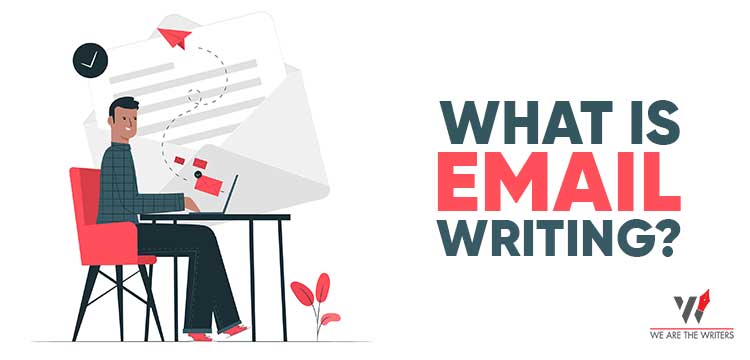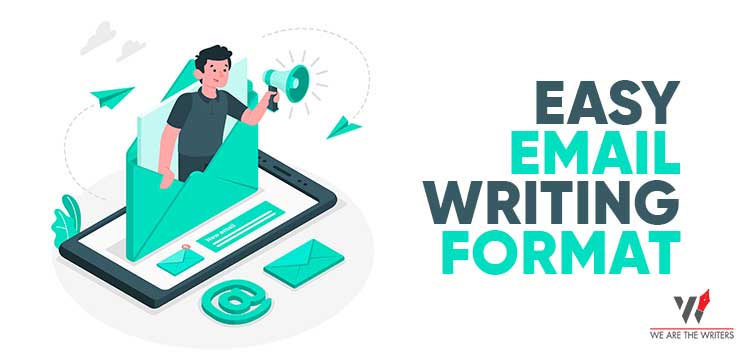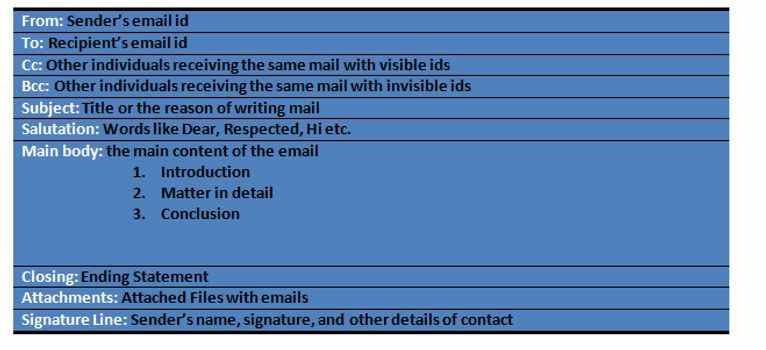There were days when emails were the standard form of communication. Now that social media sites have emerged it has got behind in the race. What do you use for submitting assignments and applications in your workplace? Mostly emails. In that case, you must know how to write email. How can you send emails that produce the desired outcomes?
In and out of the business, email is one of the most extensively utilized ways of communication. You will almost certainly use email in some manner, regardless of your profession or sector, due to its accessibility and convenience. Therefore to know how to write email writing is essential.
Academically, students are taught how to write emails from 4th or 5th grade. Email writing format for students is the same as one used for professional emails. After all, they are being molded to be a professional.
Moreover, you see the advantages of emails there are many. Emails act as a storeroom for all your important submissions. Yes, that’s a fact. You must have tried it and if not then you must!
A well-written email sends a message that is courteous, precise, succinct, and practical to the recipient. It takes experience to learn how to write email writing that fits all of these requirements.
“Email has long been a core tool for business communications, but a 2013 survey by Sendmail, Inc., found that it has caused tension, confusion, or other negative consequences for 64 percent of working professionals”
Mind Tools blog
Suggested read
- FREE EMAIL MARKETING TOOLS
- HOW TO WRITE A PRESS RELEASE
- How to write an article | 7 pro tips you should know
- HOW TO MAKE A PODCAST
What is email writing?

Email: A process of writing, delivering, saving, and receiving signals via a digital communication system is known as email. Email is the short form used for electronic mail.
Email writing is nothing but the process to draft an email. Emails are often divided into two categories: formal and informal.
How to write email writing

Email writing format

To learn how to write email writing it’s important that you understand the email writing format well.
Introduction
- Subject line: It is a brief-phrase that outlines the purpose of your message or the communication’s goal. When writing a professional email, it’s critical to include a subject line so that your recipients know what to anticipate and can readily locate the message if necessary. An email without a subject line can annoy the receiver.
Example: Leave application for a week
- Salutation: There are various ways to begin an email depending on the level of connection you share with the recipient you’re sending to, but every email should begin with greetings. Salutation is the first line of your email.
Example: Hi/Hello Mr. Philipe or Sir(if it’s not your first time)
Dear Sam(if you are writing to a junior)
To whom it may concern (generally)
Body
Similar to the body of a letter. An email body contains your full message. Since the purpose of whatever you need to express differs, there are no standard formulae for writing the body of the text. It’s a good idea to start with a rough draft and then make any necessary changes.
Some basic rules to follow:
- Avoid lengthy paragraphs. Keep it short and straight to the point.
- Try not to use acronyms while formal email writing.
- Use gaps if you are writing 3-4 paragraphs.
Lastly, you need to end your email with a closing statement. It depends on what kind of email you are writing.
Example: Awaiting response.
Thank you in advance
Do contact me to know more.
Conclusion
You can end your email using the following phrases:
- Thanking you
- Regards
- Best regards
- Your’s sincerely
This how the standard email writing format looks like. You must keep this in mind while drafting an email. Moreover, while formal email writing you need to be very coherent about each and every aspect of the format. Informal emails are for family ad friends and therefore there are relaxations.
Follow the above format and you can ace the craft of how to write email writing. Email writing format for students also contains the same format.
You must have particular email writing skills in addition to the format and structure. Are you conscious that it necessitates certain exceptional abilities? Don’t be concerned. To get the intended result, email writing skills entail simple yet critical qualities.
Suggested Blogs:
Email writing examples
With a few email writing examples, you will be more clear on how to write email writing.

Sample #1
Orders are being delivered late
Subject: Delivery delay
Dear Mr. Robinson,
With due respect, we state that we won’t be able to deliver your order on the expected date. Our suppliers are experiencing some major challenges, which will create a postponement in our production process.
We appreciate your patience and understanding. We cordially apologize for the inconvenience caused.
Best regards,
…
Sample #2

Casual leave application
Subject: Leave application
Hello ma’am,
This is to request you to approve a five-day leave for a medical emergency in my family. I will have to travel to Delhi to be there. I will be out of town for a few days because it is absolutely important.
I will be away from (start date) till (end date). I would probably resume work from Monday,(date).
I will submit the work by today evening. In case of any emergency queries, you can always reach me out at the given contact number.
I hope you will accompany my application and respond soon.
Thank You.
Your’s sincerely,
…
Sample #3

Email for proposal submission
Subject: Proposal submission email
Dear Sam,
Please kindly check the proposal you asked for your website audit contained inside this mail.
We hope you’ll find the plan to be useful and informative, and that it will satisfy your objectives. Of course, if you want to make any changes want to go in a different trajectory, kindly let us know and we’ll be pleased to talk with you about it.
Thank you for committing your website audit to (company name), and we look forward to hearing from you soon.
Best regards,
[Name and job title]
Sample #4

Inviting a friend on the weekend
Subject: Invitation to spend the weekend together
Hey Shivangi,
Hope you are doing good.
We will be spending this weekend at Neemrana. We’ll be leaving Delhi on Saturday in the evening and will return by Sunday evening. This short trip is actually meant to spend my little brother’s 10th birthday.
You are cordially invited to be a part of it. We’ll pick you from your house and drop you back safely.
Please confirm your participation, And I want to be a Yes! I will mail you the other details once you confirm.
Awaiting response.
Your’s lovingly,
…
Certain tricks to enhance your email writing skills
Still conscious about sending an email? Not sure whether you can do it? Do not think much. Moreover, below are a few tips and tricks for writing professional emails. Read on!
Decide the required result
When you start writing an email, first consider what you want the receiver to do once they’ve finished reading it. Once you’ve identified the goal of your email, make sure that everything you put in it supports that objective.
Don’t include unnecessary talks in your email
People receive tons of emails every day. Above that, if you overcommunicate in your email, it is sure going to be ignored. Before sending the email, read it and ask yourself whether all the points included are necessary or not.
Don’t share personal stuff
Email isn’t always as safe as you’d like it to be, especially when people forget to delete the chat history when forwarding emails. So don’t send emails containing delicate data, and don’t talk about something you, or the topic of your email, wouldn’t want to be emblazoned on a billboard near your office.
Minimize the length of your email
Since your recipient may not have much time to actually read your email, keep it as short as possible without omitting important information. Avoid addressing too many topics at once, as this will make your message long, hard to read, and tough to respond to.
Remove any information from your email that isn’t relevant to the topic you’re addressing while modifying it. Remove filler words and unnecessary material to create short, concise phrases. Your note will be shorter and easier to read as a result of this.
Take advantage of the subject line
What makes you read an article or a blog? Or watch a youtube video? The headline, right? The subject line is that part of an email. A null subject line is more likely to be neglected or marked as “spam,” therefore always include a few well-chosen phrases in the subject line to inform the recipient of the email’s purpose.
Use email etiquettes
To sound friendly and polite, include a kind greeting and closure. Also, remember to be respectful of the recipient’s time. Resist emailing a person seeking something after hours or when they’re on leave unless there is a necessity.
Check the tone
Be polite in your emails. This is one of the most important email writing skills one should entail. Without visual and auditory signals, your word choice, phrase length, punctuation, and capitalization can easily be misread. Therefore be very careful about it.
The emails you send are a reflection of your professionalism, ethics, and thoroughness, hence they must be formal. Avoid using informal language, slang, jargon, and improper abbreviations unless you’re on friendly terms with someone. Emojis can help you express yourself more clearly, but only use them with those you know properly.
Conclusion
No matter how experienced you are in email writing. If you want to do it, you have to do it efficiently every time. Learning how to write email writing is not an easy job if you have the right source to take help from.
After you are done with your writing and formatting, do not forget to proofread your email. Pause a second to proofread your email for spelling, grammatical mistakes, and poor punctuation before hitting “send.” As your personal emails are very much a part of your professional image as the way you dress, sending a message with errors looks bad.
That brings us to the end of this informative guide. Keep the information in mind next time you draft an email!

 WhatsApp
WhatsApp